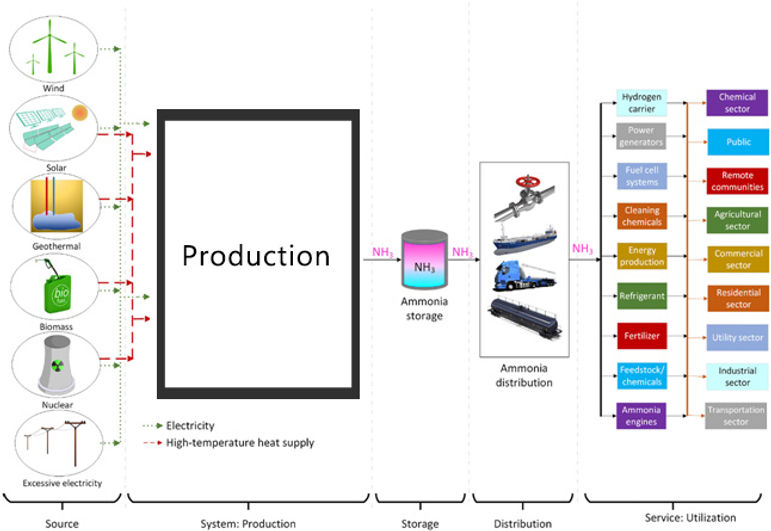
Enhancing
Green
Technologies
About Us
Ammonia is responsible for 50% of global food production. Current Ammonia production (Haber-Bosch Process) is the world’s most polluting chemical industrial process, responsible for 500MT of CO2 annual emissions. Our production process will provide green ammonia with the lowest carbon foot print in the industry.
ENOVIAS Industries developed a groundbreaking process for producing green ammonia that operates at significantly lower temperatures and pressures compared to the conventional Haber-Bosch process. The Haber-Bosch process, which has been the standard for over a century, is highly energy-intensive and environmentally taxing. In contrast, ENOVIAS Industries' method utilizes approximately 16 times less energy, drastically reducing the carbon footprint associated with ammonia production.
Key technological features of ENOVIAS Industries' green ammonia production includes:
-
Low-Temperature and Low-Pressure Synthesis: The new process operates efficiently at conditions much milder than the traditional method, leading to substantial energy savings and reduced greenhouse gas emissions.
-
Modular System Design: ENOVIAS Industries has developed a modular production system that can be easily scaled and customized for different applications. This flexibility allows for both stationery and mobile production units, facilitating onsite ammonia generation in various settings, including agricultural and industrial sites.
-
Integration with Renewable Energy Sources: The production process is designed to be compatible with renewable energy sources such as wind and solar power. This integration further reduces the carbon footprint and ensures a sustainable supply of green ammonia.
Environmental Benefits
-
Reduction in Greenhouse Gas Emissions: Traditional ammonia production is responsible for a significant portion of industrial CO2 emissions. By utilizing renewable energy and more efficient processes, ENOVIAS Industries' green ammonia production significantly lowers these emissions.
-
Sustainable Agriculture: Ammonia is a critical component in fertilizers that supports global food production. Green ammonia ensures that this essential agricultural input is produced environmentally, contributing to sustainable farming practices.
-
Decreased Dependency on Fossil Fuels: Conventional ammonia production relies heavily on natural gas. By transitioning to green ammonia, there is a reduced dependency on fossil fuels, promoting energy security and sustainability.
-
Mitigation of Climate Change: The reduction in emissions and reliance on renewable energy sources align with global efforts to combat climate change, helping countries meet their environmental targets and commitments. Market Potential and Impact ENOVIAS Industries is strategically positioned to capture a significant share of the growing market for green ammonia.
Our Solution
The Company’s system allows for the mobile and fixed modular-scale, non-toxic, non flammable and non pollutant green ammonia production. This eliminates the danger and increases the green footprint of green ammonia production, associated with the bulk storage and transport of ammonia.
Energy Saving
Decentralised
Our modular production facility can be placed onsite or we can support mobile production facilities based on the applications infrastructure requirements, alongside any Hydrogen producing facility and turn Hydrogen into Ammonia for simple storage and transport.
Greener
By having low energy requirements we are able to make the greenest Ammonia, which will help with food security where energy prices are highly fluctuating and there are also a number of initiatives to use Ammonia as a fuel of the future due to its energy density and low emissions character.
We are enabling to make Ammonia at very low temperature and pressures, the process is able to switch on and off effortlessly enabling it to work well with renewable and intermittent energy sources. We are able to make ammonia using 16x less energy than the current process (Haber-Bosch Process).
Technology Value Chain
We have developed a process that is capable at creating Ammonia at much lower temperatures and pressures than has ever been the case before.

